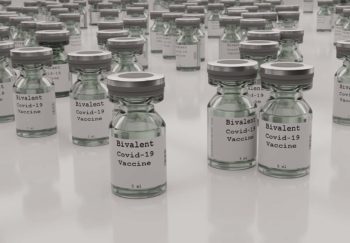Staying healthy during the cold months here in Virginia has never been more confusing. You might be sorting out — for yourself, your parents, your kids — if and when to get a COVID booster. And do you get the flu vaccine at the same time? And should you worry about monkeypox or not?
Why this matters: Masks are off. Unlike recent winters, when mask usage kept many of us generally healthy, we'll see the spread of infection rise.
Costi Sifri, MD, director of hospital epidemiology at UVA Health, gives us the answers.
Getting the Flu Vaccine
Who Should & Should Not Get the Flu Vaccine?
Need a Boost?
The bivalent booster is your best protection against the currently circulating versions of COVID.
Everyone should get the flu vaccine if they’re 6 months of age and older. Flu can be a very serious infection for specific populations, especially those at higher risk of disease, such as adults 65 years and older, adults with certain chronic health conditions, pregnant people, young children, and others as listed by the Centers for Disease Control (CDC).
On the flipside, there are a very small number of people who should not get a flu shot. These populations include children younger than six months, people with severe, life-threating allergies to any ingredient in a flu vaccine, and people who have experienced a severe allergic reaction to the flu vaccine in the past. The CDC also provides guidance for those individuals who might fall into one of these categories.
What Happens if You Don’t Get the Flu Vaccine? What Are the Consequences?
Individuals who don’t get vaccinated are more likely to get the flu and are more likely to have a significant course with the flu. A flu shot is your best bet at avoiding influenza and from passing it to others.
As far as consequences, if you track CDC data like I do, you’ll find that one cause of school absenteeism is influenza. When children are sick with the flu, they miss school, which can have a negative impact on their overall academic success. Other impacts may include increased doctors’ visits, missed work due to flu, and potentially, flu-related hospitalizations.
Why Don’t People Get Vaccinated?
The reasons vary as to why individuals don’t get vaccinated. Some people feel it’s an inconvenience. For some it’s lack of knowledge and not understanding that it can reduce the probability of getting the flu. Other people argue that they got the vaccine and during a past flu season and still got sick, so the vaccine didn’t work. And then others have concerns about the possible side effects, maybe a sore arm or allergic reactions such as an egg allergy.
What I would say is that many people get the flu vaccine with the presumption that it will prevent all infections. It does not. Also, you may think you have the flu but in fact you have a cold or different respiratory illness.
Recent studies show that flu vaccination reduces the risk of flu illness by between 40% and 60% among the overall population. How effective the vaccine is differs from year to year depending on the viral strain and how well it’s matched to the flu vaccine. But even if you get the flu after being vaccinated, your course is expected to be milder and you’re not going to get as sick.
I’d also add that there are standard flu vaccines available that are egg-free for individuals with egg allergies. So, there are options.
What Are the Risks in the Elderly Population of Not Getting a Flu Vaccine?
Flu vaccine prevents millions of illnesses and flu-related doctor’s visits each year. People 65 years and older, in particular, are at higher risk of developing serious flu complications compared with young, healthy adults. While flu seasons vary in severity, during most seasons, people 65 years and older bear the greatest burden of severe flu disease. In recent years, for example, it’s estimated that 70-85% of seasonal flu-related deaths have occurred in people 65 years and older, and 50-70% of seasonal flu-related hospitalizations have occurred among people in this age group. Flu vaccine greatly benefits the elderly population, and others in high-risk categories, for that matter.
Why Is It More Important This Season to Get the Flu Vaccine?
In the last several flu seasons, we have seen very few cases of influenza. In 2020-21, we saw very little and 2021-22 was a mild flu year. What followed was a COVID spike — the Delta wave in the fall and then Omicron in early winter. Individuals at high risk for COVID continued to practice masking, social distancing, working remotely, avoiding large gatherings, etc. The feeling among the public health community is that these behaviors likely led to a mild flu year and may have displaced influenza. We don’t believe that these same conditions are going to occur this year. We are really concerned that this season could be rough, and in fact, worse than in years prior to the pandemic.
The rationale for this thinking is that the Southern Hemisphere had a pretty bad flu year. In general, what occurs in the Southern Hemisphere can hint at what happens in the North. Bad, meaning worse than a standard flu year. Fortunately, this didn’t translate into influenza deaths. Our assumption is that people at high risk for COVID still practiced mitigation measures and so it reduced flu illnesses. Based on the experiences in the South, we might be in for a rocky road ahead. So protect yourself and those around you.
The best protection from the flu is the flu vaccine.
COVID: Still Here
People Are Weary of COVID & Acting Like the Pandemic is Over. Is It?
No, we’re still in a pandemic. People just don’t feel it as much and are moving on and trying to return to a sense of normalcy in their daily lives. Granted, we are a far cry from where we were with Omicron, but cases are still happening, people are still dying from COVID. Approximately 350 people die per day on average from COVID-19 in the United States. It’s the third leading cause of death in our country.
Should People Still Get Vaccinated? Why Not Skip the Booster?
The short answer is, yes, get vaccinated, get the booster. Clearly, we’re seeing some booster fatigue as reflected in numbers of people receiving boosters — 49.8 percent of the total booster-eligible population has not yet received a booster dose with very little change from week to week according to a September 29 CDC summary, even though the CDC is advocating for the bivalent vaccine to blunt the effects of a fall surge; to reduce the impact of COVID on communities; to reduce the stress on hospitals; and to reduce the impact of long COVID.
I’m also an advocate for the bivalent vaccine. Vaccinations do prevent infection. They’re doing what they were built to do and are much more effective in keeping people out of the hospital.
You hear a lot of criticism around breakthrough infections; however, cases are generally milder. Experts are hopeful that the new bivalent boosters will prevent even the milder cases of COVID-19 since they're a better match to current circulating strains.
We’ll see what fall brings but your best defense against COVID and its unfortunate effects is to be up to date on your vaccinations, including boosters.
Monkeypox Vaccine?
How Worried Should We Be About Monkeypox?
For the general population, monkeypox is not a serious concern. For certain at-risk individuals, however, it can be serious, and these individuals should take measures to prevent getting the disease. One of these measures is to get the monkeypox vaccination, which is available to Virginia residents who meet one of the eligibility requirements.
What Are the Risk Factors?
The highest risk activity at present is sex with multiple or anonymous partners. Avoiding these activities greatly reduces your risk of catching or spreading monkeypox. According to the Virginia Department of Health, you are at risk if you have had close, intimate contact with someone with a suspected or confirmed diagnosis of monkeypox. This includes contact with anything that was exposed to the fluid present in the lesions — bedding, towels, or clothing. It also includes contact with any bodily fluids of an infected person, such as saliva.



I had COVID at the end of August, must I still wait 3 months to get the booster?
With the increase in so many communicable disease, I’m nervous about waiting until the end of November to get a booster.